Decoding your GCMS notes is not complex!
The vast majority of GCMS notes are not complex to understand, despite the abbreviations & codes used in them and what many immigration professionals have to say about reading these notes. Many times GCMS files contain hundreds of pages and it can be a daunting task just to find the information that really matters, let alone trying to understand the information you waited so long to receive. This article will show you exactly where to find the relevant information and make the most of the notes and your time.
How to read information in a GCMS file?
STEP 1
Start with Page #2 of your GCMS notes and look for the ASSESSMENTS section, this is where your application is summarized. It will look similar to this example. To understand the various stages of an application review this write-up.

STEP 2

Also, on Page #2 if Security is redacted (blank) and you also see s15/s16 mentioned in the top right corner of the GCMS notes (as in the example above) then it means that information has been withheld from disclosure. Read this blog article to see What does disclosed in part and s15, s16 & s19 mean?
STEP 3
If Security screening is in progress then all related information is redacted from the GCMS notes. To understand how Security Screening is done review this in depth article; All about Security Screening
STEP 4
Now review the last few pages of your GCMS notes under the “Notes” section. These “Notes” are numbered and dated from the most recent to the oldest. Interpretation service is NOT necessary to understand GCMS notes and is explained next.
As part of IRCC’s Management Action Plan and in order improve the clarity on reasons for refusal, a pilot was launched in February 2022 to proactively release officer decision notes to some temporary resident visa applicants at the time of an application decision. These notes provide clients with detailed information as to why their application was refused, including a breakdown of the officer’s rationale when finalizing the application. Once the pilot has concluded, IRCC will analyze the outcomes to determine whether this initiative should be implemented more widely.
Is interpretation service necessary?
🚫 No, interpretation service is not necessary to understand your GCMS notes. You can see a sample GCMS file here and the most important and interesting part of the file is usually at the very end in the “Notes” section. It is here that the immigration officers observations and reasoning for decisions made are noted. If the visa was refused then the GCMS notes will contain in-depth reasons as to why the refusal decision was made. Such notes are easy to understand and you don’t need to pay someone to help you understand your GCMS notes. Review this sample interpretation if you would like to see what an interpretation service may look like.
What about abbreviations?
GCMS notes are full of abbreviations and acronyms which may be difficult to interpret. That’s why at GcmsNotes.com we have compiled a Coding Aid to help you interpret your notes. Below is a sample and you can find this Coding Aid and more at https://help.gcmsnotes.com/code
| Acronym | Definition |
|---|---|
| ADR | Additional Document Requirement |
| AFU | Anti Fraud Unit (used to verify applicant’s employment, family relationship etc) |
| AIP | Approval in Principal |
| AL | Authorization Letter |
| AOR | Acknowledgement of Receipt |
| AUTHORITY | Officer’s name |
| BELA | Batch Email and Letter Application (used by visa officers to send messages to applicants) |
| BGC | Background Check (includes criminality, security and info sharing) |
| BIL | Biometrics Instruction Letter |
| CDA | Canada |
| CIBIDS | Canadian Immigration Biometric Identification System |
| CMAU | Centralized Medical Admissibility Unit; located in Ottawa, Canada |
| COR | Country Of Residence |
| COI | Country Of Origin |
| EDE | Excessive demand exempt |
| EE MI | Express Entry Ministerial Instructions |
| EE Econ | Express Entry Economic Class |
| EIOD | Enforcement and Intelligence Operations Directorate (at CBSA) |
What are some other status updates in GCMS?
Below are some more examples of an application status in GCMS

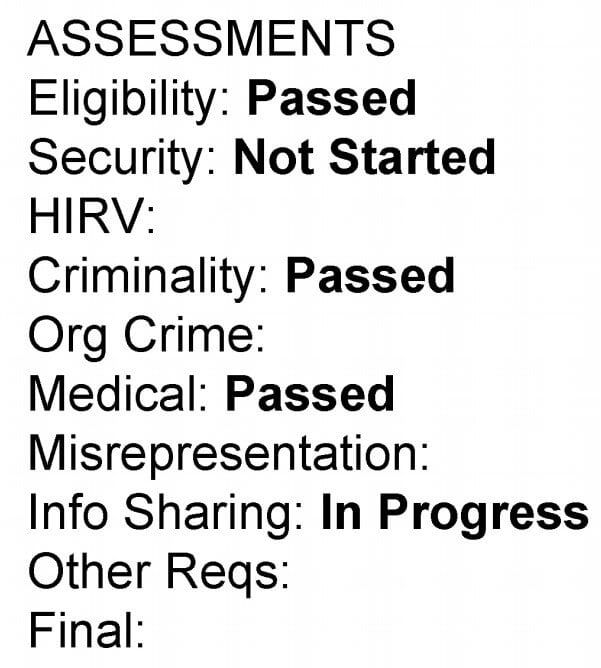
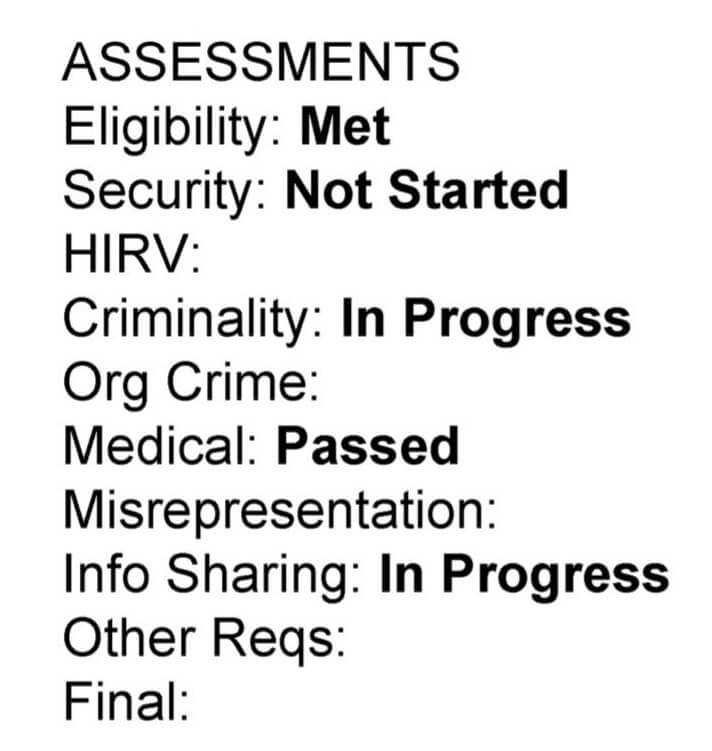
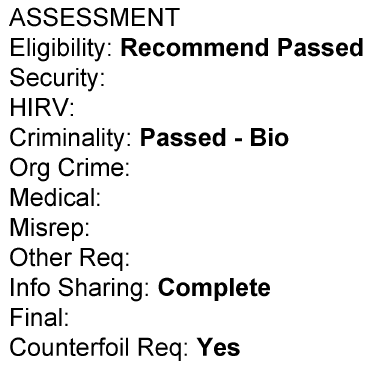
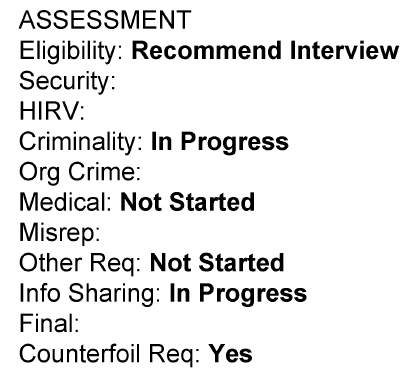
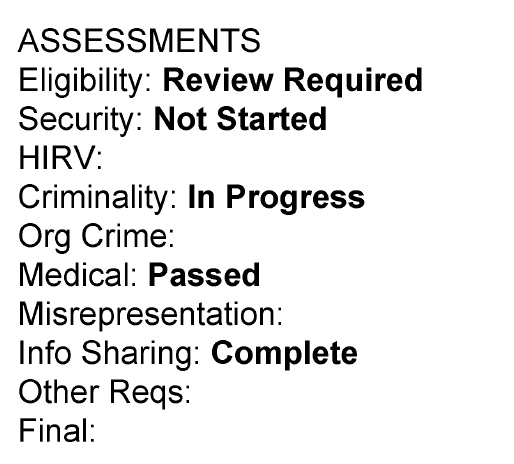
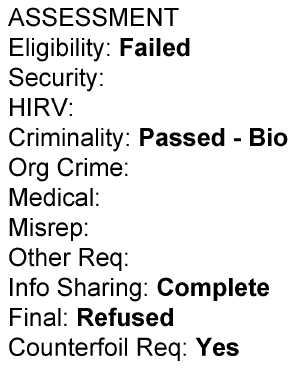
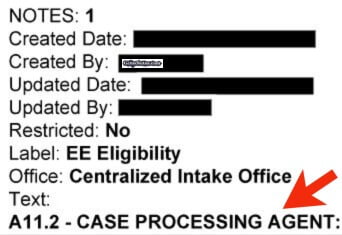

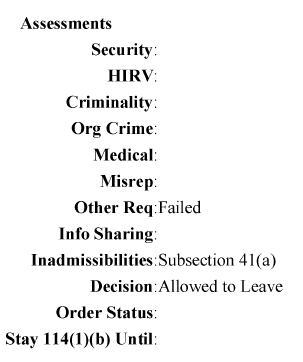
The GCMS notes are structured in a specific order, with each category assigned a page or multiple pages. Depending on whether the notes are from IRCC or CBSA and the type of visa application, certain categories may not be applicable to your situation. In such cases, the related page will not be included in your report. Here is an example of the different categories outlined in the GCMS notes.
| Section | Field | Description |
|---|---|---|
| APPLICATION | Created Date | Date application was received by IRCC |
| APPLICATION | Created by | Code of immigration officer who created the application |
| APPLICATION | Updated Date | Last date/time the application had an update |
| APPLICATION | Updated by | Code of immigration officer who last updated the application |
| APPLICATION | Primary Office | Office that will issue your passport request (PPR), usually local visa office (LVO) if applying outside Canada |
| APPLICATION | Secondary Office | Office that will assess your application |
| APPLICATION | App# | Application file number, starts with a letter followed by 9 numbers |
| APPLICATION | App Status | Application status, either “Open” or “Closed” |
| APPLICATION | App Status Reason | Reason explaining application status above, either “In Progress”, “Approved”, or “Refused” |
| APPLICATION | Received Date | Date of receipt of application by the Primary Office |
| APPLICATION | Received Via | How the Primary Office received the application, either “Online” or “Mail” |
| APPLICATION | Lock-In Date | Date of opening of application by IRCC |
| APPLICATION | Category | Code for category of immigration: “FC1” for Family Class, “SW1-FED” for Federal Skilled Worker, etc. |
| APPLICATION | Sub-Category | Further details within the main immigration category (if applicable) |
| APPLICATION | Group Name | Name of the application group, if applicable (used for processing multiple applications together) |
| APPLICATION | Group# | Number assigned to the application group (if applicable) |
| APPLICATION | Special Program(s) | Any special immigration programs included in the application (if applicable) |
| APPLICATION | Correspond Lang | Correspondence language, either “English” or other language |
| APPLICATION | Interview Lang | Language of the interview, “English”, other language, or blank if no interview is required |
| APPLICATION | Cost Recovery | Status of immigration fees payment: “Complete”, “Deferred”, etc. |
| APPLICATION | RPRF | Right of Permanent Residence Fee status: “Complete”, “Deferred”, “Not Applicable”, etc. |
| APPLICATION | Overpayment | “Yes” if there was an overpayment of fees, “No” otherwise |
| APPLICATION | Loan Warrant# | Loan warrant number used for fee payment (if applicable) |
| APPLICATION | Restricted Notes | “Yes” if there are restricted notes in |
| APPLICATION | Prospective App Delete Date | Date of application withdrawal, if applicable |
| APPLICATION | Preferred Correspondence Channel | “Online”, or “Mail” |
| APPLICATION | Name | Name of principal applicant |
| APPLICATION | DOB | Date of birth of principal applicant |
| APPLICATION | # of Client | Number of applicants, including principal applicant and dependents |
| APPLICATION | # of Potential Visas | Number of visas to be issued depending on number of applicants |
| APPLICATION | Province of Destination | As declared in the application |
| APPLICATION | City of Destination | As declared in the application |
| APPLICATION | CSQ File# | Certificat de Sélection du Québec (CSQ) file number, if applicable |
| APPLICATION | FOSS Doc# | FOSS or Field Operations Support System for applications prior to 2010 |
| APPLICATION | Associated App | |
| APPLICATION →️ Assessments | Eligibility | “Not Started”, “Calculate”, “Calculation In Progress”, “Review Required”, “Met”, or “Passed” |
| APPLICATION →️ Assessments | Security | “Not Started”, “In Progress”, “Passed” or blank |
| APPLICATION →️ Assessments | HIRV | “Not Started”, “In Progress”, “Passed” or blank |
| APPLICATION →️ Assessments | Criminality | “Not Started”, “In Progress”, or “Passed” |
| APPLICATION →️ Assessments | Org Crime | “Not Started”, “In Progress”, “Passed” or blank |
| APPLICATION →️ Assessments | Medical | “Not Started”, “Passed”, or “Failed” |
| APPLICATION →️ Assessments | Misrepresentation | usually blank |
| APPLICATION →️ Assessments | Info Sharing | “Not Started”, or “Complete” |
| APPLICATION →️ Assessments | Other Reqs | |
| APPLICATION →️ Assessments | Final | “Approved”, “Refused”, or blank |
Haven’t requested your GCMS notes?
If you haven’t requested your GCMS notes as yet and wondering about the status of your application then you can make the request right here. The only way to know the most detailed information of a visa application is by requesting GCMS notes.
